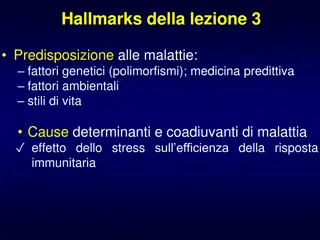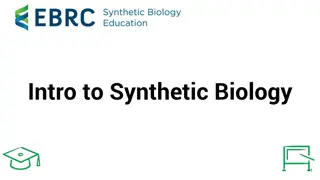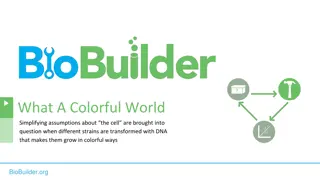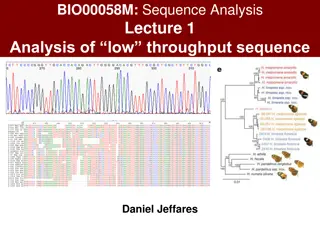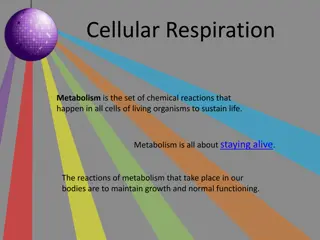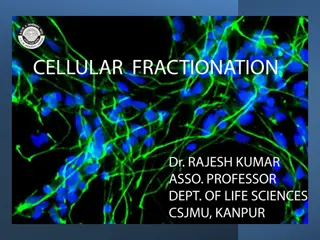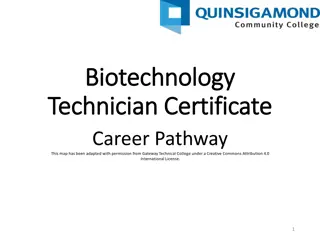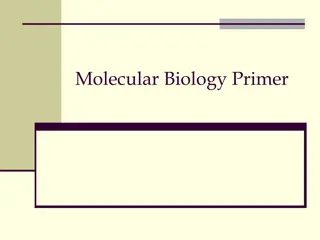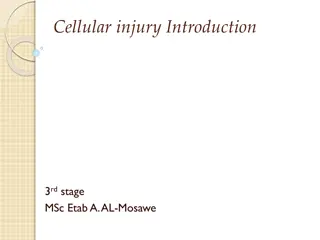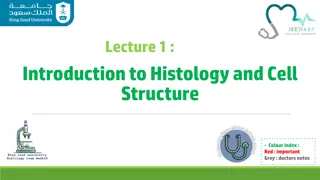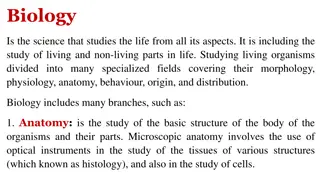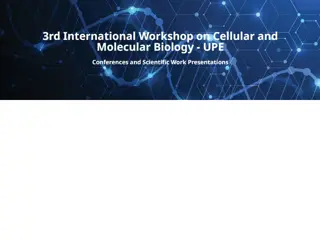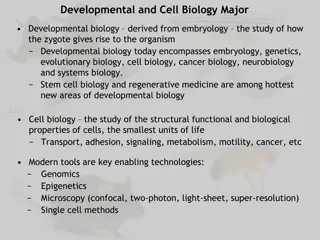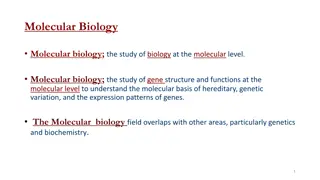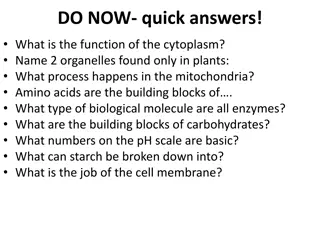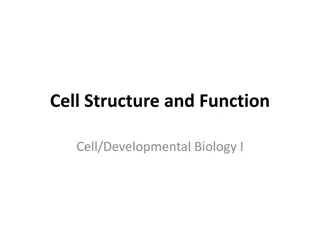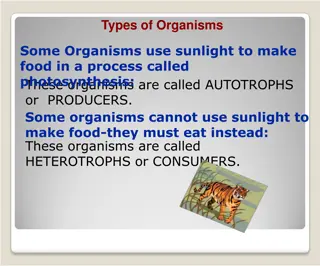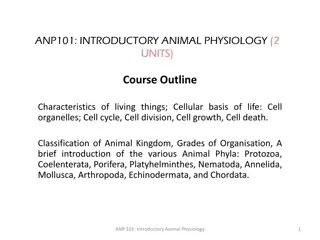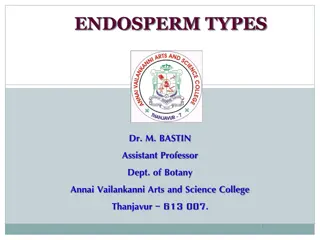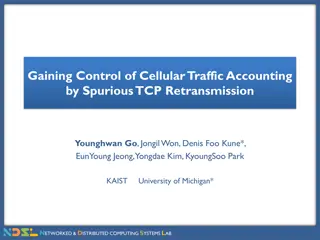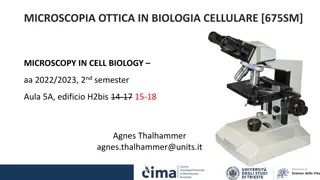8th Singapore Junior Biology Olympiad 2023 Pre-registration Briefing Information
The 8th Singapore Junior Biology Olympiad (SJBO) 2023 aims to promote the advancement of Biology among Secondary School students from Sec 2-4 levels in Singapore. This prestigious competition encourages students to excel in Biology by focusing on practical skills and critical thinking. The structure
2 views • 34 slides
Understanding Cellular Pathology: Response to Stress and Disease Predisposition
Explore the hallmarks of cellular pathology, including factors influencing disease predisposition such as genetics, environmental factors, and lifestyle. Delve into the cellular response to stress, adaptive and pathological reactions, and key stressors disrupting cellular homeostasis. Uncover how ce
0 views • 51 slides
Understanding Motor Proteins and Cytoskeletal Dynamics in Cell Biology
Motor proteins, such as myosin, kinesin, and dynein, utilize chemical energy to move along cellular tracks, influencing processes like muscle contraction, organelle movements, and cellular migration. With the ability to translocate using ATP hydrolysis, these proteins play crucial roles in various c
5 views • 14 slides
Introduction to Synthetic Biology: Understanding the Core Concepts and Applications
In this introductory lecture on synthetic biology, you will explore the fundamental principles of engineering biology, including the design and construction of new biological entities. The focus is on leveraging molecular, cell, and systems biology advancements to create biological systems that can
0 views • 89 slides
Exploring Cellular Chassis in Synthetic Biology
Assumptions about cell behavior are challenged when different strains are transformed with DNA to grow in colorful ways. Synthetic Biology uses genetic engineering to construct living systems, introducing students to molecular techniques in an engineering context. Activities such as iTUNE Device and
0 views • 24 slides
Transformative Power of Sequencing in Molecular Biology
The falling costs of sequencing have revolutionized various fields like genetics, genomics, cell biology, microbiology, and evolutionary biology. Sequencing data has enabled us to understand genomes, revolutionize cell biology techniques, conduct comparative genomics, population genomics, and metage
1 views • 31 slides
Understanding Cellular Respiration and Metabolism in Living Organisms
Cellular respiration is a vital process in all living cells, producing energy through chemical reactions. Metabolism, consisting of anabolism and catabolism, maintains growth and function. ATP plays a central role as energy currency in cells. Through stages like glycolysis and the Krebs cycle, cellu
0 views • 16 slides
Understanding Cellular Respiration and Oxygen Delivery
Cellular respiration, a vital process for organ survival, involves mitochondria performing cellular respiration by utilizing glucose and oxygen. Glucose is derived from diet or body breakdown, while oxygen enters through the respiratory system, facilitated by red blood cells in the circulatory syste
0 views • 8 slides
Basics of Biology: Introduction, Branches, and Importance
Biology, the study of living organisms, encompasses various branches such as botany, zoology, morphology, and genetics. Understanding biology is crucial for solving environmental issues, conserving natural resources, and pursuing careers in diverse fields like medicine and agriculture. Living organi
0 views • 9 slides
Neo.Go Mobile Application Integration Settings
This guide provides detailed instructions for integrating the Neo.Go mobile application with Neo security system panels using Ethernet or Cellular communication. It covers programming steps, data plan considerations, and settings for both Cellular and Ethernet communications. Ensure a proper data pl
0 views • 26 slides
Understanding Wireless Wide Area Networks (WWAN) and Cellular Network Principles
Wireless Wide Area Networks (WWAN) utilize cellular network technology like GSM to facilitate seamless communication for mobile users by creating cells in a geographic service area. Cellular networks are structured with backbone networks, base stations, and mobile stations, allowing for growth and c
2 views • 17 slides
Overview of Cellular Respiration Pathways and ATP Generation
Cellular respiration involves key processes like the Tricarboxylic Acid Cycle (TCA), Electron Transport Chain, and ATP generation pathways. The TCA cycle utilizes Acetyl-CoA to produce energy-rich molecules, while the Electron Transport Chain facilitates ATP synthesis through oxidative phosphorylati
0 views • 18 slides
Explore Cellular Respiration Through POGIL Activities
Dive into the world of cellular respiration through POGIL activities that cover topics such as glycolysis, Krebs Cycle, Electron Transport System, and more. Discover critical thinking questions and application problems related to cellular respiration processes and their real-world implications.
0 views • 6 slides
Cellular Fractionation: Techniques and Applications
Cellular fractionation is a crucial process for separating cellular components to study intracellular structures and proteins. It involves homogenization, centrifugation, and purification steps to isolate organelles based on their properties like density and shape. This method provides valuable insi
6 views • 11 slides
Biotechnology Technician Certificate Program Overview
The Biotechnology Technician certificate program offers an insight into the science and technical skills required for a career in biotechnology. Graduates gain essential laboratory skills, scientific knowledge, and critical thinking abilities to work effectively in the industry. The curriculum cover
1 views • 9 slides
Exploring the Evolution of Molecular Biology: From DNA Discovery to Genome Complexity
Uncover the fascinating journey of molecular biology, tracing key milestones from the discovery of DNA to the intricate structure of genes and genomes. Dive into historical breakthroughs, such as understanding the role of genes in producing proteins, the double helix structure of DNA, and the comple
2 views • 30 slides
Understanding Cellular Injury and Its Manifestations
Cellular injury can occur due to various factors like physical trauma, chemicals, radiation, and biologic agents. This process can lead to reversible or irreversible damage in cells, affecting their normal functions and possibly leading to cell death. Manifestations of cellular injury include cellul
0 views • 9 slides
Introduction to Histology and Cell Structure
Histology is the microscopic study of normal tissues utilizing light and electron microscopes. This field explores the composition and function of cells, focusing on the nucleus, cytoplasm, organelles, and inclusions. Thin tissue sections stained with Haematoxylin and Eosin reveal distinct cellular
0 views • 23 slides
Exploring the Fascinating World of Biology and Human Biology
Biology is a broad scientific field encompassing the study of living organisms and their various aspects, from anatomy and physiology to genetics and evolution. Branches of biology include anatomy, histology, cytology, physiology, embryology, genetics, molecular biology, biochemistry, zoology, botan
0 views • 21 slides
Exploring Cellular Structures in Quizbowl Biology
Biology in quizbowl competitions often focuses on understanding cellular structures, from organs to organelles. Players encounter questions about various organelles like mitochondria, ribosomes, chloroplasts, and the Golgi body. Ribosomes, though not classified as organelles, play a critical role in
0 views • 27 slides
Understanding Enzymes: The Catalysts of Cellular Reactions
Enzymes play a vital role in controlling cellular reactions by speeding up processes without being consumed themselves. They are biological catalysts made of proteins, with each enzyme having a specific shape for its designated molecule. This summary highlights the importance of enzymes in cellular
0 views • 47 slides
Biology Program Overview at Southwest Ohio Region
The Southwest Ohio region offers a comprehensive Biology program with a diverse faculty, a large student enrollment, and articulation agreements with universities like University of Cincinnati and Wright State University. The Biology A.S. curriculum includes courses in biology, chemistry, compositio
0 views • 6 slides
Highlights from the 3rd International Workshop on Cellular and Molecular Biology
Explore images from the 3rd International Workshop on Cellular and Molecular Biology showcasing various aspects of the event and the participation of experts in the field. Dive into the world of cellular and molecular biology through these visual representations.
0 views • 10 slides
Explore the World of Developmental and Cell Biology
Developmental biology, stemming from embryology, investigates how organisms evolve from a zygote. It merges various fields like genetics, cell biology, and cancer biology. Cell biology focuses on cell properties and behaviors, using tools like genomics and microscopy. Research areas include cancer c
0 views • 8 slides
Exploring Molecular Biology and Cell Science
Molecular biology delves into the study of biology at the molecular level, focusing on gene structure and functions to comprehend hereditary traits, genetic variation, and gene expression patterns. Cells, the fundamental units of life, vary in shape and function but share basic structures. The Three
0 views • 31 slides
Philosophy of Biology: A Methodological Provocation Before the Emergence of Biology
Philosophy of biology before the formal establishment of biology as a discipline explores the evolution of terms and theories related to the science of life. By delving into key philosophical works from the 19th and 20th centuries, the interaction between history, philosophy, and science in the fiel
0 views • 13 slides
Biology Review: America Says Game Show Overview
America Says, a game show on the Game Show Network, features rounds covering various biology topics such as properties of life, cell structures, and biochemical reactions like cellular respiration. The game includes top seven answers for each round, a bonus round, and a tiebreaker. Images depict key
0 views • 10 slides
Cellular Processes and Functions Explained
The cytoplasm is essential for cell function, housing organelles like chloroplasts and vacuoles unique to plants. Mitochondria facilitate cellular respiration, while amino acids form proteins. Enzymes are proteins, and carbohydrates consist of simple sugars. Basic pH numbers range from 8 to 14. Star
0 views • 24 slides
Exploring Cell Structure and Function in Developmental Biology
Discover the intricate world of cell structure and function in the context of developmental biology. Delve into the inner workings of organelles, their functions, and how they contribute to cellular activities. Engage in interactive activities like building cell models and playing Cell Detective to
0 views • 14 slides
Exploring Cellular Biology: From Cells to DNA
Delve into the intricacies of cellular biology by comparing prokaryotic and eukaryotic cells, investigating cellular processes, understanding viral structures and reproduction, exploring the cell cycle stages, examining specialized cells, and recognizing the crucial roles of DNA and RNA in cell diff
0 views • 42 slides
Understanding Cellular Respiration: Energy Production in Organisms
Organisms can be classified into autotrophs that use sunlight for photosynthesis and heterotrophs that rely on consuming food. Regardless of food source, all organisms obtain energy through cellular respiration, a process that converts stored chemical energy into ATP. This energy currency is essenti
0 views • 21 slides
Energy-Efficient Handover Triggering for Cellular Networks
Mobile devices play a crucial role in today's world, with a surge in mobile subscriptions and applications. However, energy consumption, particularly battery life, remains a challenge. The study focuses on Application-Based Handover Triggering (AHT) as a solution to optimize energy usage in cellular
0 views • 24 slides
Introduction to Animal Physiology and Cellular Biology Overview
This comprehensive course delves into the fundamental aspects of animal physiology and cellular biology. Topics covered include the characteristics of living organisms, cellular organelles, the cell cycle, division, growth, and death. Additionally, the course introduces the various animal phyla, fro
0 views • 43 slides
Understanding the Types of Endosperm in Angiosperms
Endosperm is the nutritive tissue formed in angiosperms through triple fusion, serving to nourish the embryo. There are three main types of endosperm: Nuclear, Cellular, and Helobial, each characterized by distinct modes of development. Nuclear endosperm features repeated division of the primary nuc
0 views • 16 slides
Alternative Cellular Avalanche Model for Solar Flares
Exploring an alternative cellular avalanche model based on the maximum release of energy during solar flares, this research delves into optimizing models to study the quasi-static evolution of coronal magnetic fields. Through a series of image objects and studies, the study presents various cellular
0 views • 16 slides
Cellular Compartmentalization Unit in Biology Course
This unit focuses on cellular compartmentalization in cells, targeting second-year students in intro biology or microbiology courses. Students explore structural and functional differences between prokaryotic and eukaryotic cells through learning goals and an engaging alien mystery experiment from V
0 views • 25 slides
Understanding Cellular Traffic Accounting and TCP Retransmissions
Delve into the complexities of cellular traffic accounting, focusing on the impact of TCP retransmissions on network data billing. Explore the challenges faced by cellular providers in accurately charging subscribers for data usage amidst increasing traffic volumes. Consider the implications of TCP
0 views • 31 slides
Cellular Network Positioning Techniques for Location Estimation
Utilizing cellular signal strength information for positioning devices within a network, this study explores network-side positioning methods such as fingerprinting in cellular networks. The research delves into the process of estimating device locations by analyzing received signal strengths from n
0 views • 29 slides
Microscopic Techniques in Cell Biology: Lessons and Labs Overview
Explore the fascinating world of optical microscopy in cellular biology, covering topics such as image formation, contrasting techniques, fluorescence microscopy, live-imaging techniques, and quantitative microscopy. Dive into the principles behind various microscopy techniques and experimental labs
0 views • 7 slides
Enhancing Statistical Literacy in Biology Education through Collaborative Approach
Collaborating between statistics and biology disciplines can address challenges in transferring knowledge across fields, emphasizing experimental design, ethics, and data analysis in biology education. Integration of statistical reasoning in biology classes and quantitative competencies in modern bi
0 views • 33 slides

